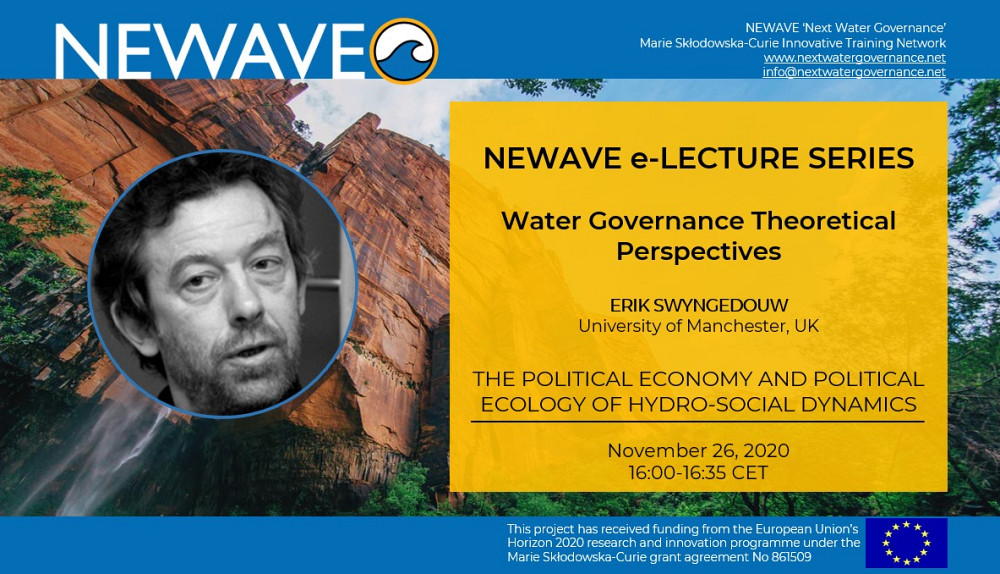NEWAVE e-Lecture Series: The political economy and political ecology of hydro-social dynamics | Prof. Erik Swyngedouw
The political economy and political ecology of hydro-social dynamics
We are witnessing something unprecedented: Water no longer flows downhill. It flows towards money (Robert F. Kennedy Jr.) Over the past few years, a growing body of work has emerged on the political-economy and political-ecology of water and water circulation. This is re-defining the contours of water resources research and opening up an exciting and vitally important research agenda for the years to come. Political-ecological perspectives on water suggest a close correlation between the transformations of and in the hydrological cycle at local, regional, and global levels on the one hand and relations of social, political, economic, and/or cultural power on the other. In a sustained attempt to transcend the modernist nature-society binaries, hydro-social research envisions the circulation of water as a combined physical and social process, as a hybridised socio-natural flow that fuses together nature and society in inseparable manners. It calls for revisiting traditional fragmented and interdisciplinary approaches to the study of water by insisting on the inseparability of the social and the physical in the production of particular hydro-social configurations. Such perspective opens all manner of new and key research issues and urges considering a transformation in the way in which water policies are thought about, formulated, and implemented. The seminar will focus on both conceptual issues and provide empirical illustrations.
References:
Swyngedouw, E. (1997). Power, Nature, and the City. The Conquest of Water and the Political Ecology of Urbanization in Guayaquil, Ecuador: 1880–1990. Environment and Planning A: Economy and Space, 29(2), 311–332.
Swyngedouw, E. (1999), Modernity and Hybridity: Nature, Regeneracionismo, and the Production of the Spanish Waterscape, 1890–1930. Annals of the Association of American Geographers, 89: 443-465.
Swyngedouw, Erik., Kaika, Maria & Castro, Jose Esteban. (2002). Urban Water: A Political-Ecology Perspective. Built Environment (1978-). 28. 124-137.
Swyngedouw, Erik. (2013). UN Water Report 2012: Depoliticizing Water. Development and Change. 44. 10.1111/dech.12033.
Boelens,R., Hoogesteger, J., Swyngedouw, E., Vos, J. & Wester, P. (2016). Hydrosocial territories: a political ecology perspective. Water International vol 41, No.1, 1-14.
Prof. Erik Swyngedouw
Prof. Erik Swyngedouw is a professor of geography at the University of Manchester in the School of Environment, Education and Development, and a member of the Manchester Urban Institute. Prof. Swyngedouw has committed his studies to political-economic analysis of contemporary capitalism, producing several major works on economic globalisation, regional development, finance, and urbanisation. His interests have also included political-ecological themes, and the transformation of nature, urban governance, politics of scale, notably water issues, in Ecuador, Spain, the UK, and elsewhere in Europe. His recent work focuses on democratic politics and the strategies and tactics of new political movements, and the political ecology of desalination. He has published over 100 academic papers in leading academic journals in geography and cognate disciplines and in scholarly books.
About the e-Lecture Series:
This online training module has the objective to engage the NEWAVESRs and the audience in different water governance perspectives. All lectures are open to the public upon registration.
Please register here
A participation certificate can be requested if attending at least 80% of the online public talks.
*All times are in CET (UTC+1)
We would love to know what you think! Please leave a comment below and engage in our online discussion group.




